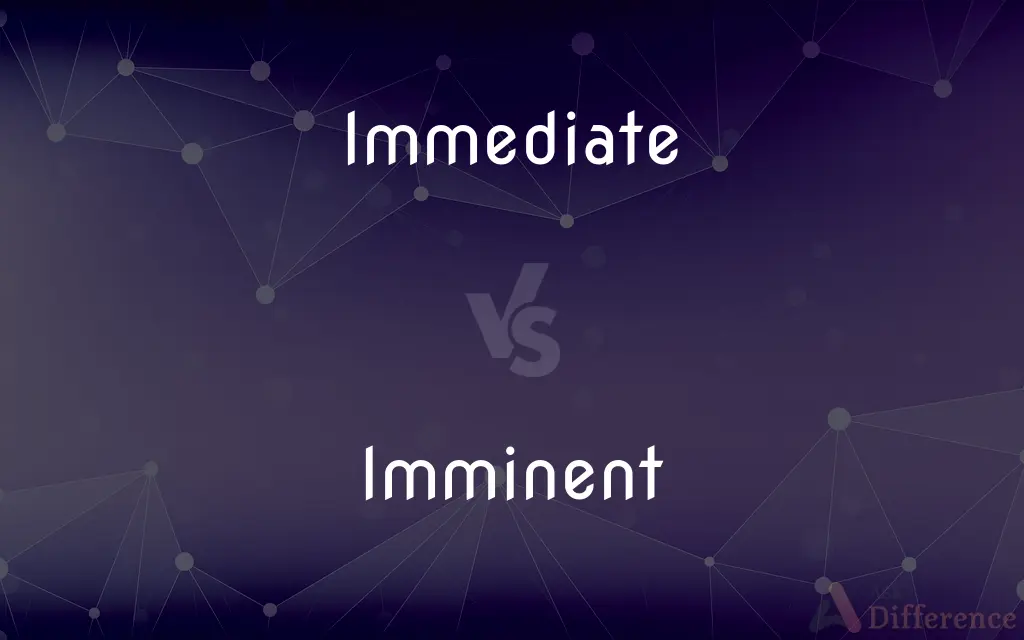Immediate vs. Imminent — What's the Difference?
By Tayyaba Rehman & Fiza Rafique — Updated on April 1, 2024
Immediate refers to something happening right now or without delay, whereas imminent suggests something is likely to happen very soon.

Difference Between Immediate and Imminent
Table of Contents
ADVERTISEMENT
Key Differences
Immediate action is required in situations demanding an instant response, emphasizing the lack of any delay or waiting period. On the other hand, imminent refers to the anticipation of an event that is about to occur, highlighting a sense of inevitability or nearness in time rather than instantaneity.
Immediate often describes actions, reactions, or effects that follow directly with no intervening time, underscoring the concept of directness and promptness in response. Whereas imminent is used to describe events or occurrences that are on the verge of happening, indicating a future inevitability that is just around the corner but not happening at this very moment.
In the context of urgency and priority, immediate conveys a higher level of urgency, requiring attention or action at once. Imminent, while still suggesting a need for readiness, allows for a brief, albeit often very short, period of preparation or anticipation before the event occurs.
The term immediate can also be used to describe physical proximity, not just temporal, implying closeness or directness in space. In contrast, imminent does not pertain to spatial relationships but strictly to the likelihood of an upcoming event or situation.
Immediate satisfaction or consequences are often expected in real-time scenarios, where the outcome follows an action without delay. Imminent, however, forecasts the near certainty of future events, providing a window, however slight, for response or preparation before the event unfolds.
ADVERTISEMENT
Comparison Chart
Definition
Happening now or without any delay.
Likely to happen very soon.
Temporal Aspect
Instantaneous, with no intervening time.
Near future, with a sense of inevitability.
Urgency
Higher urgency, requiring instant action.
Suggests readiness for something soon to occur.
Spatial Relevance
Can describe physical proximity.
Pertains only to temporal proximity.
Use in Sentences
Immediate response, immediate vicinity.
Imminent danger, imminent arrival.
Compare with Definitions
Immediate
Occurring or done at once; instant.
He saw the results of his decision in immediate consequences.
Imminent
About to happen.
They were warned of the imminent storm.
Immediate
Pertaining to something that cannot be delayed.
The situation called for an immediate response.
Imminent
Looming or pending in the near future.
The imminent arrival of guests prompted a flurry of preparation.
Immediate
Relating to the present moment.
The immediate concern was to find shelter.
Imminent
Impending or on the verge of occurring.
The sense of imminent danger was palpable.
Immediate
Directly connected or adjacent.
They were in the immediate vicinity of the accident.
Imminent
Suggesting something is inevitable.
With the clouds gathering, rain was imminent.
Immediate
Without any intervening time or space.
She demanded immediate action to resolve the issue.
Imminent
Referring to the nearness of an event in time.
The project's completion is imminent.
Immediate
Occurring at once; happening without delay
Needed immediate treatment for the injuries.
Imminent
About to occur; impending
In imminent danger.
Immediate
Of or near the present time
In the immediate future.
Imminent
About to happen, occur, or take place very soon, especially of something which won't last long.
Immediate
Of or relating to the present time and place; current
"It is probable that, apart from the most immediate, pragmatic, technical revisions, the writer's effort to detach himself from his work is quixotic" (Joyce Carol Oates).
Imminent
Threatening to occur immediately; near at hand; impending; - said especially of misfortune or peril.
Immediate
Close at hand; near
In the immediate vicinity.
Imminent
Full of danger; threatening; menacing; perilous.
Hairbreadth scapes i' the imminent deadly breach.
Immediate
Next in line or relation
Is an immediate successor to the president of the company.
Imminent
With upon) Bent upon; attentive to.
Their eyes ever imminent upon worldly matters.
Three times to-dayYou have defended me from imminent death.
No story I unfold of public woes,Nor bear advices of impending foes.
Fierce faces threatening war.
Immediate
Acting or occurring without the interposition of another agency or object; direct
An immediate cause.
Imminent
Close in time; about to occur;
Retribution is at hand
Some people believe the day of judgment is close at hand
In imminent danger
His impending retirement
Immediate
Happening right away, instantly, with no delay.
Computer users these days expect immediate results when they click on a link.
Immediate
Very close; direct or adjacent.
Immediate family;
Immediate vicinity
Immediate
Manifestly true; requiring no argument.
Immediate
Embedded as part of the instruction itself, rather than stored elsewhere (such as a register or memory location).
Immediate
Used to denote that a transmission is urgent.
Bravo Three, this Bravo Six. Immediate! We are coming under fire from the north from an unknown enemy, over!
Immediate
An artillery fire mission modifier for to types of fire mission to denote an immediate need for fire: Immediate smoke, all guns involved must reload smoke and fire. Immediate suppression, all guns involved fire the rounds currently loaded and then switch to high explosive with impact fused (unless fuses are specified).
Hotel Two-Niner, this is Bravo Six. Immediate suppression at grid November-Kilo four-five-three two-one-five. Danger Close. I authenticate Golf Echo, over.
Immediate
Not separated in respect to place by anything intervening; proximate; close; as, immediate contact.
You are the most immediate to our throne.
Immediate
Not deferred by an interval of time; present; instant.
Death . . . not yet inflicted, as he feared,By some immediate stroke.
Immediate
Acting with nothing interposed or between, or without the intervention of another object as a cause, means, or agency; acting, perceived, or produced, directly; as, an immediate cause.
The immediate knowledge of the past is therefore impossible.
Immediate
Very close or connected in space or time;
Contiguous events
Immediate contact
The immediate vicinity
The immediate past
Immediate
Having no intervening medium;
An immediate influence
Immediate
Immediately before or after as in a chain of cause and effect;
The immediate result
The immediate cause of the trouble
Immediate
Of the present time and place;
The immediate revisions
Immediate
Performed with little or no delay;
An immediate reply to my letter
Prompt obedience
Was quick to respond
A straightaway denial
Common Curiosities
What does immediate mean?
Immediate means happening right now or without any delay, indicating instant action or presence.
How do I use immediate in a sentence?
"Immediate" is used to describe actions or effects that happen without delay, e.g., "The injury required immediate attention."
Can something be both immediate and imminent?
In some contexts, an event might feel both immediate and imminent, especially if it's about to happen right away, but typically "immediate" focuses on the now, and "imminent" on the very near future.
How do I use imminent in a sentence?
"Imminent" is used to describe something about to happen, e.g., "They were warned about the imminent danger."
Can immediate refer to space as well as time?
Yes, "immediate" can also describe something in close proximity, not just temporality.
Is the immediacy of an action the same as its importance?
Not always; immediacy refers to the timing of an action, while its importance is a measure of its significance or priority.
Is imminent always negative?
While often used in the context of warnings or danger, "imminent" can refer to any event about to happen, positive or negative.
How does the concept of immediacy apply in digital communication?
In digital communication, immediacy can refer to real-time interactions or responses, emphasizing the expectation of quick or instant engagement.
What does imminent mean?
Imminent suggests that something is likely to occur very soon, highlighting its nearness in time and inevitability.
What's the difference between immediate and direct?
"Immediate" often implies no delay in time, while "direct" can refer to straightforwardness or the shortest path in both time and space.
Share Your Discovery

Previous Comparison
Sloped vs. Slopped
Next Comparison
Autoload vs. LoadAuthor Spotlight
Written by
Tayyaba RehmanTayyaba Rehman is a distinguished writer, currently serving as a primary contributor to askdifference.com. As a researcher in semantics and etymology, Tayyaba's passion for the complexity of languages and their distinctions has found a perfect home on the platform. Tayyaba delves into the intricacies of language, distinguishing between commonly confused words and phrases, thereby providing clarity for readers worldwide.
Co-written by
Fiza RafiqueFiza Rafique is a skilled content writer at AskDifference.com, where she meticulously refines and enhances written pieces. Drawing from her vast editorial expertise, Fiza ensures clarity, accuracy, and precision in every article. Passionate about language, she continually seeks to elevate the quality of content for readers worldwide.












































